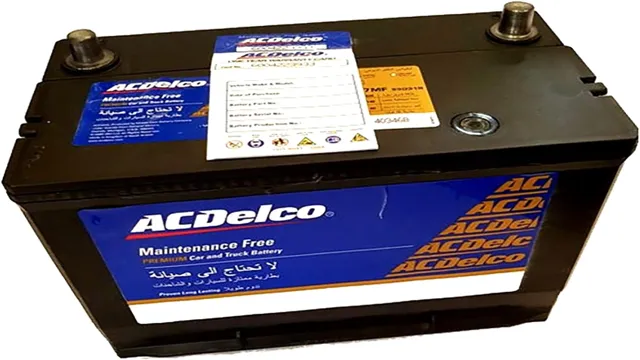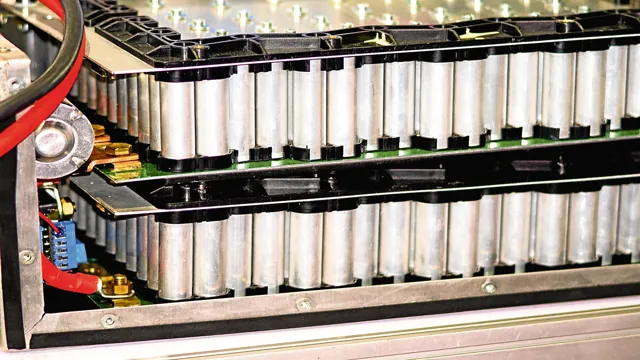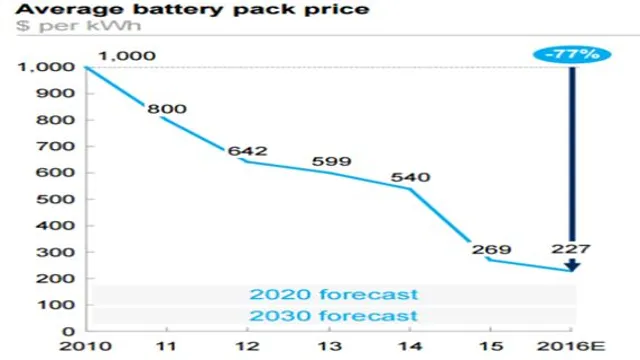Power up your ride with a stock of high-performance batteries for electric cars
Electric cars have been gaining popularity in recent years and are an excellent option for those looking to reduce their carbon footprint. One of the key components of electric vehicles is the batteries that power them. These batteries are not just your average car battery – they are specially designed to provide the necessary energy to propel the vehicle.
In this blog, we will be discussing everything you need to know about batteries for electric cars and how they power your ride. When it comes to electric car batteries, there are a few essential factors to consider. The size of the battery, its capacity, and its charging time are some of the key aspects to look into before investing in an electric car.
The battery’s size is crucial as it determines the car’s overall range and how far you can travel on a single charge. The battery’s capacity, on the other hand, indicates how much energy it can store and how long it will last before needing a recharge. Additionally, electric car batteries have a specific charging time that varies from model to model.
However, more advanced charging technology has made it possible to charge electric cars faster than ever before. Additionally, there are now various types of chargers available, and the rate at which the battery charges largely depends on the type of charger used. To extend the lifespan of your electric car battery, proper maintenance is required.
This includes avoiding extreme weather conditions, regular charging, and not overcharging the battery. By taking good care of your electric car battery, you can ensure that it keeps powering your ride for years to come. In conclusion, batteries are the heart of an electric car, and their performance plays a crucial role in the vehicle’s overall efficiency.
Therefore, it is essential to understand how batteries power your ride, what factors to consider before investing in an electric car, and how to maintain your battery’s longevity. So, let’s get started and power our ride with electric cars and eco-friendly batteries.
Types of Electric Car Batteries
When it comes to electric cars, the battery is the heart of the vehicle. How long an electric car can run and how much distance it can cover depends on the type of battery it uses. There are various types of batteries that can be used in electric cars, including lead-acid, nickel-metal hydride, and lithium-ion.
Lead-acid batteries are the oldest type of battery and tend to be the least expensive, but they have a short lifespan and are heavy. Nickel-metal hydride batteries are an improvement on lead-acid batteries and can store more energy, but they also have a shorter lifespan and are less efficient. Lithium-ion batteries are the most commonly used batteries in electric cars today because they are lightweight, have a longer lifespan, and can store more energy.
They’re more expensive to manufacture, but they’re also more efficient and provide a better range. As battery technology continues to advance, electric cars are becoming more reliable, energy-efficient, and practical for everyday use.
Lithium-ion Batteries
Lithium-ion batteries are the most commonly used type of battery in electric cars, but there are different kinds of lithium-ion batteries available. The most common types of lithium-ion batteries used in electric cars are the nickel-manganese-cobalt (NMC) and lithium-iron-phosphate (LFP) batteries. NMC batteries are known for their high energy density, which means they can store a lot of energy in a small space.
They are also highly efficient and can last for several years. LFP batteries, on the other hand, are known for their safety and long life cycle, as they can withstand over 4,000 charging cycles without degrading. They have lower energy density compared to NMC batteries, but are safer due to their lower risk of thermal runaway.
It is important to note that while both NMC and LFP batteries have their advantages, the specific battery used in an electric car may vary based on the manufacturer’s preference. Ultimately, the type of battery used in an electric car plays a crucial role in driving performance and safety.

Lead-Acid Batteries
Lead-Acid Batteries When it comes to types of electric car batteries, lead-acid batteries are one option that has been around for quite some time. They have been used in cars for over a century, so they’re well-known and trusted. They consist of lead plates and an electrolyte solution, and they work by using a chemical reaction to create electricity.
While they may not be the most high-tech option on the market, they do have their advantages. They’re relatively inexpensive, which is a big plus for many people, and they’re also very durable. They’re also widely available and easy to find, which can be important if you need to replace a battery quickly.
Plus, most lead-acid batteries can be recycled, making them an environmentally friendly choice. However, there are some downsides to consider. They’re fairly heavy, so if you’re looking to reduce the weight of your car, lead-acid batteries may not be the best choice.
Additionally, they don’t offer as much energy density as some other types of batteries, so you may need to recharge them more frequently. Overall, if you’re looking for a reliable and cost-effective option, lead-acid batteries may be worth considering.
Nickel-Metal Hydride Batteries
Nickel-metal hydride batteries are one of the types of electric car batteries on the market. They are made up of a combination of nickel, metal, and an alkaline electrolyte, and are popular in hybrid vehicles due to their high energy density and low cost. Compared to other types of batteries, nickel-metal hydride batteries have a longer lifespan and are more environmentally friendly.
However, they are not as efficient as lithium-ion batteries and do not provide as much power. Despite this, they are still a popular choice for hybrid cars due to their affordability and reliability. Overall, the choice of battery for an electric car depends on the specific needs and preferences of the driver, as each type of battery has its own set of advantages and disadvantages.
Choosing the Right Battery for Your Electric Car
When it comes to choosing the right battery for your electric car, it’s important to consider a few key factors. Firstly, you’ll want to look at the battery’s range – how far can it take you on a single charge? This will largely depend on your driving habits and the types of journeys you’ll be making. Additionally, consider the battery’s charging time – how long will it take to fully recharge? This is especially important if you plan to take longer journeys or need your car for daily commutes.
Other important factors include the battery’s durability, weight, and cost. It’s worth doing some research and comparing different batteries to find one that meets your specific needs and preferences. If you’re considering purchasing batteries for electric car stock, it’s important to ensure you have a range of options available to cater to different customer needs and preferences.
Consider Range and Capacity
When it comes to electric cars, choosing the right battery is essential for both range and capacity. The range of the battery refers to the distance the car can travel on a single charge, while the capacity refers to how much energy the battery can hold. It’s important to consider both of these factors when selecting a battery for your electric car.
If you have a longer commute or plan to frequently travel long distances, a battery with a larger range may be necessary. On the other hand, if you only use your electric car for short trips or have easy access to charging stations, a smaller range battery may work for you. Capacity is also important to consider, as a larger battery can provide more power for acceleration and overall performance.
The cost of the battery is also a factor to consider, as larger batteries tend to be more expensive than smaller ones. However, investing in a larger battery may save you money in the long run, as you won’t have to charge the car as frequently and can travel further on a single charge. Overall, choosing the right battery for your electric car requires careful consideration of both range and capacity, as well as your personal driving habits and budget.
By selecting the right battery, you can ensure optimal performance and a satisfying driving experience.
Look for Battery Safety Features
When it comes to choosing the right battery for your electric car, there are a few things you should look for to ensure your safety and the longevity of your vehicle. One of the most important features to consider is battery safety. You want to make sure your battery has safety mechanisms in place to prevent overcharging, overheating, and other potential hazards.
Look for batteries with built-in protection circuitry that can detect and react to any abnormalities in the battery’s performance. These safety features can help prevent catastrophic failures and prolong the life of your battery pack. Remember, safety should always be a top priority when it comes to electric vehicles, so take the time to research and choose a battery that prioritizes safety above all else.
Compare Price and Warranty
When it comes to choosing the right battery for your electric car, two things you’ll want to consider are the price and warranty. Of course, you’ll want to find a battery that fits within your budget, but you also don’t want to skimp on quality. Cheaper batteries may seem like a good deal, but they could end up costing you in the long run if they don’t last as long or perform as well as a more expensive option.
In addition to price, you’ll want to take a look at the warranty offered by the manufacturer. A longer warranty can give you peace of mind knowing that the battery is backed by the company and will be replaced if it fails prematurely. Ultimately, it’s about finding a balance between price and quality, so take your time and do your research to find the best battery for your needs.
Battery Maintenance Tips for Electric Cars
If you own an electric car, taking care of the batteries is critical to ensure that they last as long as possible. One of the simplest things you can do is to avoid letting the batteries drain completely. While it might be tempting to push your vehicle to the limits, this can actually damage the batteries over time, reducing their lifespan.
To keep the batteries in good condition, make a habit of charging your electric car when the battery level reaches 20% or higher. When you do charge the batteries, be sure to use a charger that’s appropriate for your vehicle and follow the manufacturer’s instructions. Finally, it’s also a good idea to store your electric car with at least a partial charge to avoid the batteries draining completely.
By following these simple battery maintenance tips, you can help ensure your electric car stays in top condition and runs smoothly for years to come. And if you need to replace the batteries for your electrical car, stock up on high-quality batteries to keep your car running at its best.
Charge Your Battery Regularly
Electric cars are the wave of the future, but they require special care when it comes to battery maintenance. One of the most important tips for electric car owners is to charge their battery regularly. This might seem like common sense, but many people forget to charge their battery until it’s almost empty.
Not only does this limit your car’s range, but it can also damage the battery over time. It’s recommended to charge your battery to around 80-90% and then stop charging. If you regularly fully charge the battery, you run the risk of reducing its overall lifespan.
So, it’s important to maintain a good charging routine to keep your electric car battery in prime condition. Remember, taking care of your battery means taking care of your car, so charge away!
Monitor Battery Health
Electric car owners should stay vigilant about their battery health to ensure they get the most out of their vehicle’s battery life. Regularly monitoring your electric car’s battery is essential for maintaining optimal performance. Some key tips for maintaining battery health include ensuring the battery is charging as it should, keeping it at a moderate temperature and avoiding letting it drop below 20% charge.
Additionally, it’s essential to maintain the right levels of tire inflation and brake efficiency as these factors play a significant role in preserving battery life. To help monitor your battery’s health, keep an eye on the vehicle’s dashboard for any warning signs of low battery power or other related issues. By following these tips, electric car owners can enjoy a longer-lasting battery and more efficient driving experience.
Where to Find Batteries for Your Electric Car
If you’re an electric car driver, you may be wondering where to find stock of batteries for your vehicle. Fortunately, there are several options available. The easiest and most convenient is to contact your car manufacturer, who will either supply batteries directly or provide information on authorized dealers.
You can also check with online suppliers, such as Amazon, who offer a variety of electric car batteries at competitive prices. Additionally, local car dealerships may stock replacement batteries or be able to order them for you. Don’t forget to also check out specialty electric car shops or mechanics, who may have extensive knowledge and access to electric vehicle parts.
Whatever option you choose, make sure to do your research and compare prices to ensure you’re getting the best deal possible on your batteries for your electric car.
Conclusion
In conclusion, investing in batteries for electric cars is like investing in a literal power boost for the future. As technology continues to advance, the demand for electric vehicles will only grow, and the battle for the most efficient and longest-lasting battery will rage on. So, stock up on these energy-packed powerhouses, and watch your portfolio charge forward into the green energy revolution!”
FAQs
What are the best batteries for an electric car?
Lithium-ion batteries are currently the most popular and efficient type of batteries for electric cars. Other types of batteries, like lead-acid and nickel-metal hydride (NiMH), are also used.
How long do electric car batteries last?
The lifespan of electric car batteries depends on various factors such as usage, temperature, and maintenance. On average, most electric car batteries last between 8-10 years or up to 100,000 miles.
Can electric car batteries be recycled?
Yes, electric car batteries can be recycled. The lithium-ion batteries used in electric cars contain valuable metals like cobalt, nickel, and lithium that can be extracted and reused in new batteries or other products.
How long does it take to charge an electric car battery?
The charging time for electric car batteries varies depending on the type of charger and the capacity of the battery. Most electric cars can be charged overnight using a Level 2 charger, which takes around 4-8 hours. Fast charging stations can charge the battery up to 80% in around 30 minutes.





